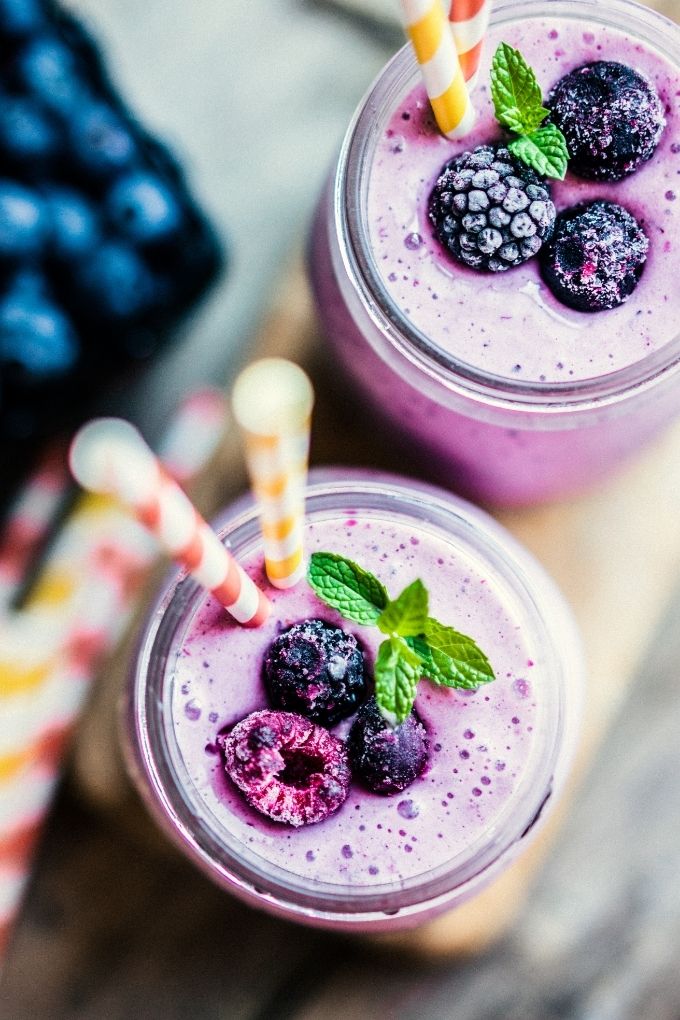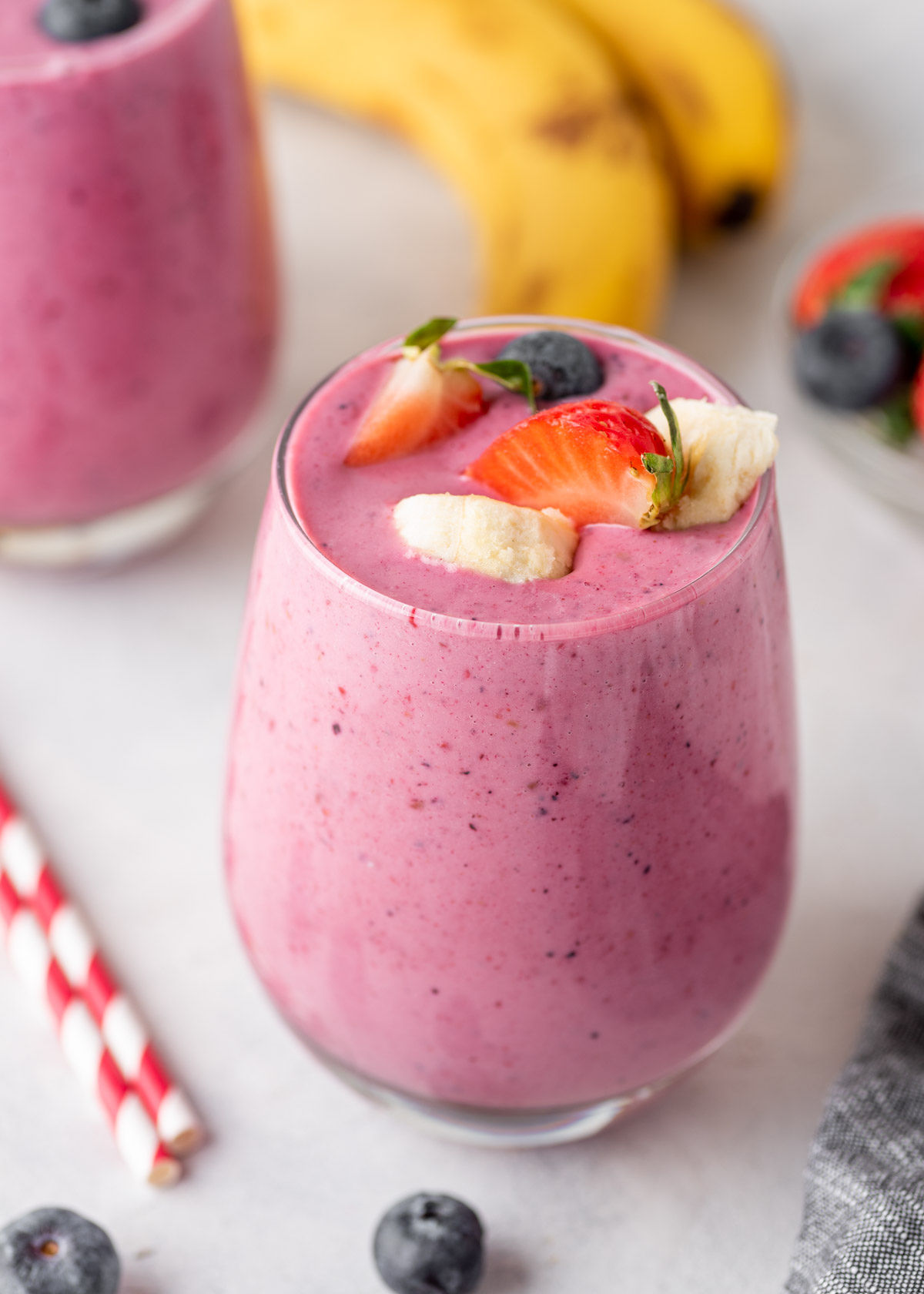When it comes to building muscle, most people think of protein shakes, chicken breast, or eggs. But did you know that certain fruits can also play a vital role in muscle growth and recovery? Fruits are not only rich in vitamins, minerals, and antioxidants but also provide natural sugars and fiber that support energy levels during workouts.
According to health experts and nutrition reports, fruits like guava, banana, papaya, jackfruit, custard apple, and pomegranate can improve workout performance, aid in muscle repair, and boost recovery. Let's break down the top six fruits that can help you build and maintain muscle, with expanded recipes and smoothies targeted at global fitness audiences from gym-goers in the US to athletes in Europe and Asia.
1. Banana – The Energy and Muscle Recovery Fruit
Bananas are often called the ultimate pre- and post-workout snack. With about 1.1 grams of protein per 100 grams (USDA data), bananas may not be as protein-rich as meats or legumes, but they are packed with:
- Carbohydrates that restore glycogen stores
- Potassium that prevents muscle cramps
- Natural sugars that provide quick energy
Health experts note that our bodies require a continuous supply of amino acids to maintain and build muscle. Pairing bananas with a protein-rich food, like yogurt or peanut butter, makes it an excellent muscle-friendly snack.
Recipe: Banana Protein Smoothie (Serves 1) Ingredients:
- 1 banana
- 1 scoop protein powder
- 1 cup milk or almond milk
- Handful of spinach Instructions: Blend until smooth. Benefits: Quick energy for workouts, popular among global fitness enthusiasts.
2. Jackfruit – A Plant-Based Protein Booster
Jackfruit is gaining popularity among athletes and fitness enthusiasts. This tropical fruit contains about 1.9 grams of protein per 100 grams (International Journal of Food Science) and is loaded with:
- Complex carbohydrates for energy
- Potassium for muscle repair and function
- Dietary fiber for digestion and satiety
Enjoy ripe jackfruit as part of your lunch or a post-workout snack to support long-term recovery and endurance.
Recipe: Jackfruit Smoothie Bowl (Serves 1) Ingredients:
- 1 cup jackfruit chunks
- ½ banana
- ½ cup yogurt
- Toppings: Nuts, seeds Instructions: Blend jackfruit, banana, and yogurt; top with extras. Benefits: Vegan-friendly for global plant-based diets.
3. Pomegranate – The Antioxidant-Rich Recovery Fruit
Pomegranate contains 1.7 grams of protein per 100 grams, but what makes it stand out is its antioxidant profile. Studies suggest that pomegranates can:
- Reduce inflammation caused by intense workouts
- Improve blood circulation to muscles
- Speed up recovery time
Drinking fresh pomegranate juice or snacking on the seeds after exercise can help accelerate muscle repair and reduce soreness.
Recipe: Pomegranate Berry Blend Smoothie (Serves 1) Ingredients:
- ½ cup pomegranate seeds
- ½ cup mixed berries
- 1 banana
- 1 cup Greek yogurt Instructions: Blend for a thick, recovery-boosting drink. Benefits: Antioxidants for athletes worldwide.
4. Papaya – The Enzyme-Powered Muscle Support
Papaya may only provide 1.3 grams of protein per fruit (around 275 g), but it offers something special—papain, a natural enzyme. Papain supports:
- Better protein digestion
- Reduced muscle soreness
- Faster nutrient absorption
Eating fresh papaya as a post-meal snack can help your body utilize proteins more efficiently, making it an excellent addition to your muscle-building diet.
Recipe: Papaya Protein Smoothie (Serves 1) Ingredients:
- 1 cup papaya chunks
- 1 scoop protein powder
- ½ banana
- 1 cup coconut water Instructions: Blend for tropical recovery. Benefits: Enzyme aid for global tropical diets.
5. Custard Apple – The Glycogen Replenisher
Custard apple, also known as sweetsop, contains 2.1 grams of protein per 100 grams. It is also a great source of carbohydrates, which are essential for replenishing energy after workouts.
Why it's good for muscles:
- Provides quick energy
- Supports glycogen restoration
- Helps in muscle repair
You can enjoy it fresh as an evening snack or right after your workout for added recovery benefits.
Recipe: Custard Apple Smoothie (Serves 1) Ingredients:
- 1 custard apple (pulp)
- ½ cup berries
- 1 cup milk
- Handful of nuts Instructions: Blend and enjoy. Benefits: Carb reload for endurance training.
6. Guava – The Protein-Packed Immunity Booster
Among all fruits, guava is one of the richest in protein, offering 2.6 grams of protein per 100 grams. In addition, it is packed with:
- Vitamin C to boost immunity and repair tissues
- Fiber for digestion and satiety
- Antioxidants that fight muscle inflammation
Eating fresh guava slices or drinking guava juice can help support muscle recovery and overall wellness.
Recipe: Guava Berry Protein Smoothie (Serves 1) Ingredients:
- 1 guava, chopped
- ½ cup berries
- 1 banana
- 1 scoop protein powder
- 1 cup water Instructions: Blend for a vitamin C boost. Benefits: Immunity for active lifestyles globally.
Final Thoughts
While fruits alone may not replace traditional protein sources like meat, legumes, or whey protein, they play a significant role in supporting muscle growth and recovery. Adding these six fruits—banana, jackfruit, pomegranate, papaya, custard apple, and guava—to your diet, especially via smoothies and recipes, can give your muscles the extra nutrients they need to stay strong, recover faster, and perform better. Target fitness audiences globally by incorporating these into post-workout routines.
FAQs
- Can fruits alone build muscle? No, fruits cannot build muscle on their own. They should be part of a balanced diet that includes protein-rich foods, healthy fats, and carbohydrates.
- Which fruit has the highest protein content? Guava has the most protein among common fruits, with about 2.6 grams per 100 grams.
- Are fruits good before or after workouts? Yes. Bananas and jackfruit are excellent pre-workout for energy, while pomegranate and papaya are better post-workout for recovery.
- Can I replace protein shakes with fruits? No, protein shakes usually contain much more protein than fruits. However, fruits can complement protein shakes for added nutrients and antioxidants.
Disclaimer
This article is for informational purposes only and should not replace professional medical or nutritional advice. Always consult a certified nutritionist or healthcare provider before making significant changes to your diet or fitness routine.




Comments
Post a Comment
Thanks for your response,May God bless you